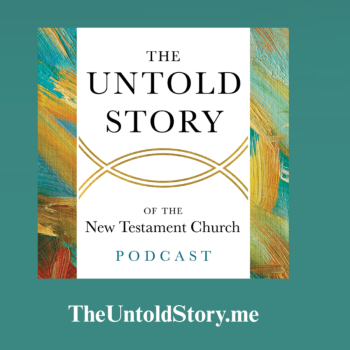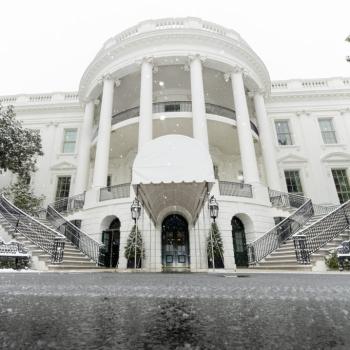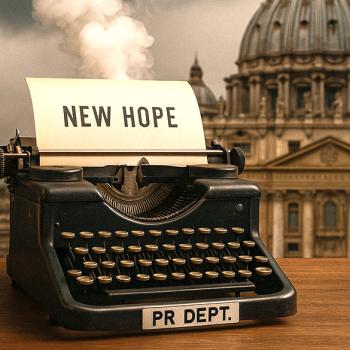We never feel the full brunt of our own choices, and we are never left to bear the full consequences of our own sinful behavior. What would normally be a self-perpetuating process leading from self-concern to self-absorption to self-obsession is interrupted, by a call to nobler things. A tenuous connection to the divine persists, a reaching after, tender mercies that call us back from the precipice, and beckon us to change course. One finds, wrote the psychologist William James, "that the tenderer parts of [our] personal life" connect us to a source of infinite tenderness "which is operative in the world outside" ourselves; a source that we "can keep in working touch with, and in a fashion get on board of . . . when all [our] lower being has gone to pieces in the wreck."
These intimations of grace, these hints of a doom deflected, bear record of consequences that someone else has borne, pains another has suffered, where we ought to have. The atonement of Jesus Christ, His agony in Gethsemane and His death on the cross, is the only action by which the wounds of sin and hurt that rend the world can be repaired. The words of Isaiah describe the "suffering servant's" mission: "to bind up the brokenhearted, to proclaim liberty to the captives, and the opening of the prison to them that are bound; . . . to comfort all that mourn; to appoint unto them that mourn in Zion, to give unto them beauty for ashes, the oil of joy for mourning, the garment of praise for the spirit of heaviness."
This great healing of the universe is centered on the breach in our relationship with our God. That relationship is the most important one in which we participate. In some measure this is because it is the foundation of all human relationships of which we are a part, and which are impaired and crippled by sin. The majesty and mystery of Christ's sacrifice have the palpable impact of eternal consequence, though we have only glimmers of understanding. There is a logic to the power of the Atonement, if no certainty as to its workings.
What we do know is that on a hillside outside Jerusalem's city wall, two millennia ago, the man known to history as Jesus of Nazareth, and adored by His followers as the Son of God, submitted to be executed by a protracted, agonizing death on a cross. "I lay down my life for the sheep," He said. "And I, when I am lifted up from the earth, will draw all people to myself." His death was a willing sacrifice that secured immortality for man. When He rose from the dead on Easter morning He was the first fruits of a universal resurrection He only could usher in. Endless life is no boon by itself, however. God's purpose is to give us not mere existence in the eternities, but "an abundant life," a life fully like His own. His design is not to extend our life indefinitely, but to enhance it permanently. That is why atonement involves much more than Christ's death on a cross.
Jesus told His disciples that His blood was specifically "poured out for many for the forgiveness of sins." In the moments before His physical torments commenced on Calvary, the evangelist describes the incomprehensible anguish of soul that Christ suffered. As He collapsed under the compounded weight of human sin and sorrow, "an angel from heaven appeared to him and gave him strength. In his anguish he prayed more earnestly, and his sweat became like great drops of blood falling down on the ground." The garden was aptly named; Gethsemane means place of the olive press, where "Ev'n God himself [was] pressed for my sake."
What can it mean, that Christ's blood was spilt for our sins, that "by his bruises we are healed"? Perhaps His perfect love means His identification with human suffering is so complete, that in one fell vision He comprehended the depth and range and terror of all our individual pain. Perhaps it is the almost irresistible power of His superabundant love manifest in His choice to suffer what He suffered, that transforms the sinner's heart.
In some way He deflected the consequences of our own sinful choices, absorbing them Himself, willingly suffering the alienation even from His Father that His fearful words on the cross signified. Thereby He upholds and affirms human agency, by ensuring consequences follow choice—and we witness how terrible they can be, without ourselves experiencing their full onslaught. Somehow He "suffered these things for all, that they might not suffer if they would repent." In some manner and by some mechanism that the scriptures decline to explicate, Christ suffered for, on behalf of, on account of, and in the stead of, us. The question, however, remains: on what basis can the consequences of our choices be deferred or abated?
The law of moral agency, of choice and consequence, does not require that we entirely bear the burden of our own choices made in this life because those choices are always made under circumstances that are less than perfect. Our accountability is thus always partial, incomplete. Into that gap between choice and accountability, the Lord steps. Christ's atonement provides a way to break the cycle of sin, and begin a new life-course (in ways large or small) with a newly forged disposition. Growing in the hard-won knowledge of good and evil, we are better able to choose in the greater light of a fuller understanding, or with a more unencumbered will.




